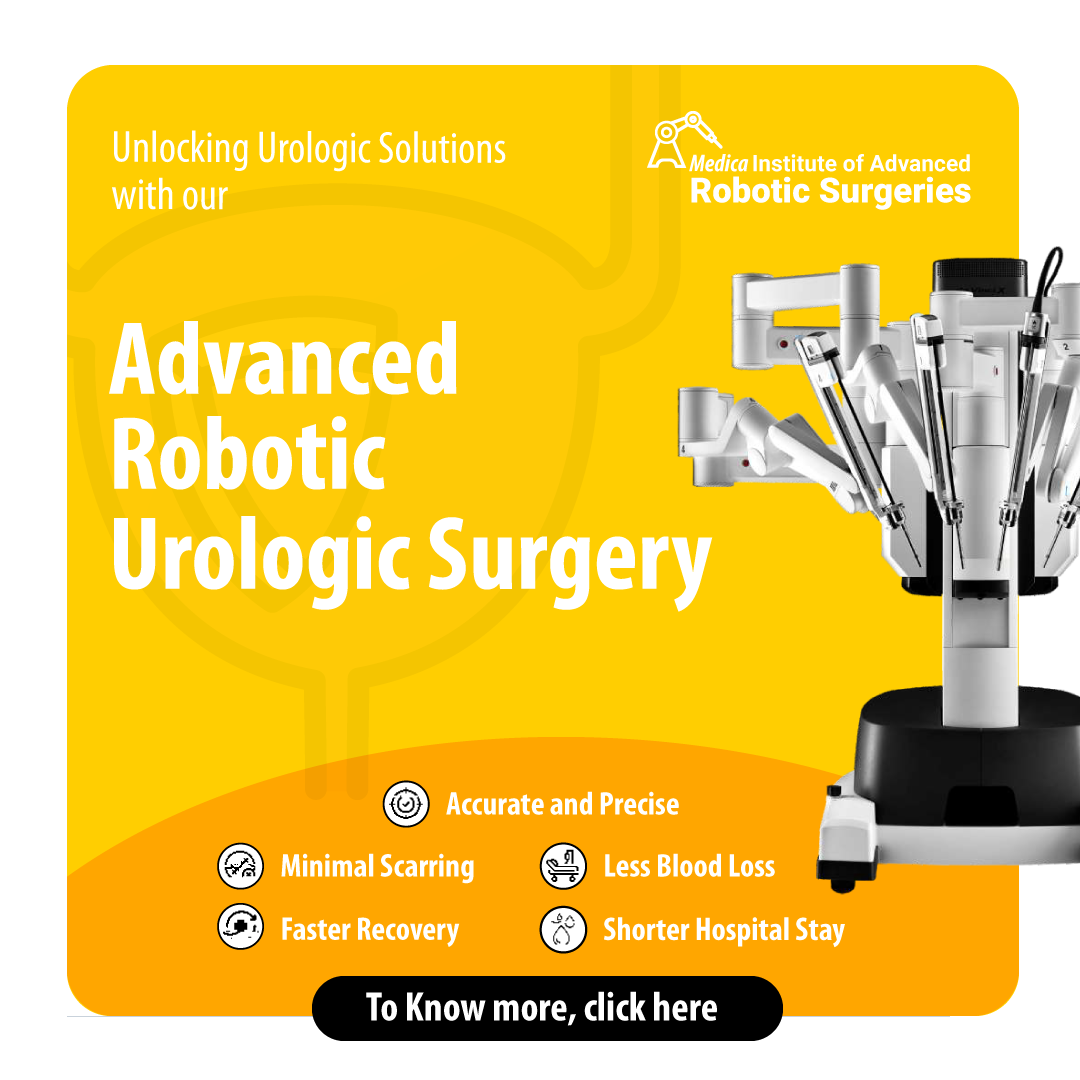Laparoscopic Kidney Stone Removal at Medica
Kidney stones are mineral and acid salt deposits that clump together in concentrated urine. They can cause discomfort when moving through the urinary tract, but they rarely cause long-term damage. In India, how many people have kidney stones? In India, it is estimated that 12% of the population has urinary stones, with 50% of them suffering from kidney failure or injury. Urinary stones afflict approximately 15% of the people in northern India. Men have an 11 percent chance of developing kidney stones, while women have a 9 percent chance. Other disorders that raise the incidence of kidney stones include high blood pressure, diabetes, and obesity.
The treatment for kidney stones is simply removing the stones from ones kidneys. It can be done through medications or through surgery. Minimally invasive kidney stone removals are performed at Medica Superspecialty Hospital in Kolkata. Which is only made possible with the support of cutting-edge technology and equipment. Our team of urologists specialize in using these advanced technologies to perform sophisticated urological surgery at a reasonable cost. We have all the facilities of a world-class healthcare provider keeping in mind efficiency and patient safety.
Free Doctor Assessment
Types of Kidney Stones
It isn’t necessary for all kidney stones to be made of the same crystal types. The four main forms of kidney stones are listed below.
- Calcium: The most common types of kidney stones are calcium stones. Calcium oxalate is the most common component. To reduce the risk of these sorts of stones, it is recommended that you eat foods that are low in oxalate.
- Uric Acid: In comparison to women, men are more likely to develop uric acid kidney stones. These stones are more likely to form in people who have extremely acidic urine.
- Struvite: Struvite stones are larger than other types of stones, and they frequently cause urinary obstruction. Passing urine is uncomfortable and difficult for the patient. Kidney infections cause these symptoms.
- Cystine: It is a type of acid that is distributed throughout the body and is excreted through the kidneys into the urine. These stones are more common in men and women who have the hereditary disease Cystinuria.
Symptoms of Kidney Stones
If you are showing the following signs, you may be at increased risk of having kidney stones. It is important to seek medical attention at the earliest. The symptoms one should look out for include:
- Backache
- Blood in urine
- Nausea
- Fever
- Pain during urination
- Cloudy urine
- Frequent urge to urinate
- Passing less urine
A word regarding the discomfort of Kidney Stones
Kidney stones are generally painless throughout the development stage. When these enter crystalline structure, however, they begin to cause discomfort. When it starts traveling down the body on its own, it creates agonizing pain. Treatment for kidney stones can only be done after the doctor finds out the stage of progression your condition is at. After ascertaining the scale of the problem, the doctor will accordingly advise you with a remedy.
Renal stone or Kidney stone is a risk factor of an impaired kidney function
Seek help from an expert
Call NowCauses of Kidney Stones
One must realize that the lack of water in the body is the most common cause of kidney stones. In other words, persons who drink less water on a regular basis are at a higher risk of developing kidney stones. As a result, it is suggested that you consume at least 2-3 liters of water every day.
Certain disorders, such as Crohn’s disease, Renal Tubular Acidosis, and Dent’s disease, can cause kidney stones. Kidney stones are a possibility for those who are undergoing chemotherapy.
When the body does not get enough water to dilute uric acid, the urine becomes acidic. Kidney stones form when urine becomes overly acidic. One must understand that kidney stones are not born in one day. It takes some time for the enzymes to become solid, so when getting advise from a doctor, the patient must be ‘patient’ with the mode of treatment prescribed. Medica hospital has some of the best nephrologists and urologists, who have exhibited their excellence over and over again through their dedication towards their work and their humane approach towards their patients. And one must be assured by the fact that kidney stones are one of the oldest known ailment known to men, therefore it’s treatment has today reached a point of perfection at almost every multispecialty hospital.
Diagnosis
If your doctor notices symptoms connected to kidney stones, he or she may recommend the following diagnostic tests and procedures:
- Blood testing: These tests reveal whether your blood has too much calcium or uric acid. It assists doctors in determining the health of your kidneys.
- Urine Testing: Your doctor may recommend that you have two urine collections over two days to determine the amount of stone-forming minerals in your urine.
- Imaging Tests: Simple abdominal X-rays, CT scans, and ultrasound may be used to detect the presence of kidney stones in your urinary tract. Intravenous urography is a more advanced procedure that involves injecting a dye into an arm vein and taking x-rays or CT pictures while the dye passes through the kidneys and bladder.
- Analyzing Passed Kidney Stones: You will pass urine through a strainer to collect and analyze kidney stones passing through urine in a lab.
Your overall kidney’s health will determine the success of your treatment for kidney stones. But a proper diagnosis can help the doctor to properly dig out the cause of your ailment.

Minimally Invasive
Surgery

World Renowned
Experts
EMI Facility
Available

Covid Safe
Environment
Kidney Stone Treatment
The size, specific placement, and consistency of the stone, as well as the patient’s state, all influence how the stone is managed. It includes everything from medication to surgery. The size of the stone is the most important criterion in selecting the modality.
Surgery is performed to keep kidney function from decreasing and disease from developing.
Retrograde Intrarenal Surgery (RIRS): Retrograde Intrarenal Surgery is ureterorenoscopy with a flexible ureteroscope (RIRS). It can be used to remove stones from any part of the tract. It’s designed for patients for whom ESWL isn’t possible or has failed. The surgeon may see practically any part of the urinary system with these flexible scopes.
This minimally invasive urological technique is typically used to address conditions that would be difficult to treat otherwise, such as:
- Strictures or tumors in the kidney.
- Kidney stones that are too big to be treated with lithotripsy.
- Kidney stones in children.
- Kidney thrombosis or other types of bleeding ailments.
- Previously failed attempts.
Ureterorenoscopic (URS) Lithotripsy with Holmium Laser Treatment: When a stone becomes lodged in the bladder or the ureter, doctors use a device called a ureteroscope to remove it. There is no need for an incision, therefore it is a non-invasive procedure. A rigid ureteroscope with a laser fiber is introduced into the Bladder and Ureter through the Urethra. The Holmium energy ray is sent through the laser fiber, breaking up the kidney stone, which is then removed through the urethra by the surgeon. Smaller fragments are excreted in the urine.
The kidney doctor (nephrologist) may place a stent between the bladder and the kidney to make it easier to pass kidney stones and enhance healing.
The consumption of Indian food has long been known as a risk factor for kidney stone formation
Seek help from an expert
Call NowPercutaneous Nephrostolithotomy(PCNL): It is a procedure for removing kidney stones through the skin. This approach entails removing a stone through a small incision in the back of the patient. When using these techniques, keep the following in mind:
- The obstruction caused by the stone causes infection or injury to the kidney.
- When a stone is too large to move through smoothly, a person experiences excruciating discomfort.
Extracorporeal Shock Wave Lithotripsy (ESWL): Lithotripsy is defined as the extracorporeal shock waves (electromagnetic), which are sound waves, that are primarily utilized to break down stones into tiny particles, which then move gently into the bladder. It’s a difficult procedure that frequently necessitates anesthetic. The person may experience discomfort in the abdomen and back. There’s also the possibility of bleeding around the kidneys.
Treatment for kidney stones at Medica Superspecialty Hospital, Kolkata is done by the best of minds on both adults and children alike. Not only doctors, and trained support staff, but our hospital









